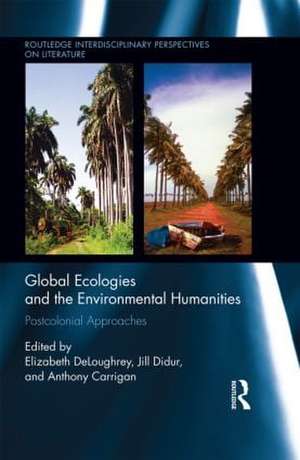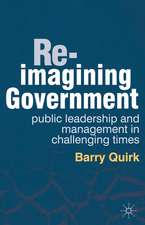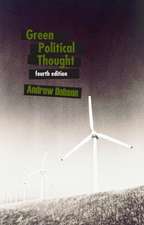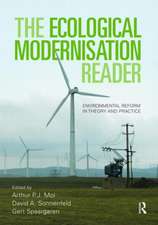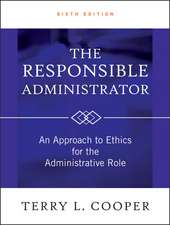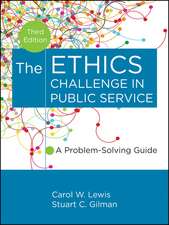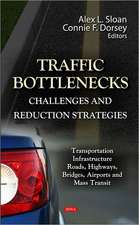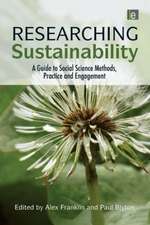Global Ecologies and the Environmental Humanities: Postcolonial Approaches: Routledge Interdisciplinary Perspectives on Literature
Editat de Elizabeth DeLoughrey, Jill Didur, Anthony Carriganen Limba Engleză Hardback – 15 apr 2015
The volume presents a postcolonial approach to the environmental humanities, especially in conjunction with current thinking in areas such as political ecology and environmental justice. Spanning regions such as Africa, Asia, Eastern Europe, Latin America and the Caribbean, Australasia and the Pacific, as well as North America, the volume includes essays by founding figures in the field as well as new scholars, providing vital new interdisciplinary perspectives on: the politics of the earth; disaster, vulnerability, and resilience; political ecologies and environmental justice; world ecologies; and the Anthropocene. In engaging critical ecologies, the volume poses a postcolonial environmental humanities for the twenty-first century. At the heart of this is a conviction that a thoroughly global, postcolonial, and comparative approach is essential to defining the emergent field of the environmental humanities, and that this field has much to offer in understanding critical issues surrounding the creation of alternative ecological futures.
| Toate formatele și edițiile | Preț | Express |
|---|---|---|
| Paperback (1) | 416.22 lei 6-8 săpt. | |
| Taylor & Francis – 29 sep 2016 | 416.22 lei 6-8 săpt. | |
| Hardback (1) | 1117.07 lei 6-8 săpt. | |
| Taylor & Francis – 15 apr 2015 | 1117.07 lei 6-8 săpt. |
Din seria Routledge Interdisciplinary Perspectives on Literature
-
 Preț: 277.97 lei
Preț: 277.97 lei -
 Preț: 311.26 lei
Preț: 311.26 lei -
 Preț: 377.87 lei
Preț: 377.87 lei -
 Preț: 339.94 lei
Preț: 339.94 lei -
 Preț: 311.56 lei
Preț: 311.56 lei -
 Preț: 309.27 lei
Preț: 309.27 lei -
 Preț: 310.29 lei
Preț: 310.29 lei -
 Preț: 310.60 lei
Preț: 310.60 lei - 9%
 Preț: 1007.22 lei
Preț: 1007.22 lei -
 Preț: 371.71 lei
Preț: 371.71 lei - 26%
 Preț: 819.48 lei
Preț: 819.48 lei -
 Preț: 442.68 lei
Preț: 442.68 lei - 18%
 Preț: 1110.74 lei
Preț: 1110.74 lei - 26%
 Preț: 877.19 lei
Preț: 877.19 lei - 18%
 Preț: 1117.43 lei
Preț: 1117.43 lei -
 Preț: 486.38 lei
Preț: 486.38 lei - 18%
 Preț: 700.62 lei
Preț: 700.62 lei - 18%
 Preț: 1063.31 lei
Preț: 1063.31 lei - 18%
 Preț: 707.86 lei
Preț: 707.86 lei -
 Preț: 488.29 lei
Preț: 488.29 lei - 18%
 Preț: 1057.05 lei
Preț: 1057.05 lei -
 Preț: 383.63 lei
Preț: 383.63 lei - 18%
 Preț: 1109.99 lei
Preț: 1109.99 lei - 18%
 Preț: 1112.34 lei
Preț: 1112.34 lei - 5%
 Preț: 1223.90 lei
Preț: 1223.90 lei - 18%
 Preț: 1036.35 lei
Preț: 1036.35 lei - 18%
 Preț: 1057.89 lei
Preț: 1057.89 lei -
 Preț: 448.49 lei
Preț: 448.49 lei - 18%
 Preț: 1109.99 lei
Preț: 1109.99 lei - 18%
 Preț: 1052.35 lei
Preț: 1052.35 lei - 18%
 Preț: 1118.82 lei
Preț: 1118.82 lei - 18%
 Preț: 1057.09 lei
Preț: 1057.09 lei - 28%
 Preț: 822.01 lei
Preț: 822.01 lei - 18%
 Preț: 1053.16 lei
Preț: 1053.16 lei - 18%
 Preț: 1112.90 lei
Preț: 1112.90 lei - 18%
 Preț: 1109.99 lei
Preț: 1109.99 lei - 18%
 Preț: 1054.27 lei
Preț: 1054.27 lei - 18%
 Preț: 1112.34 lei
Preț: 1112.34 lei - 5%
 Preț: 1222.85 lei
Preț: 1222.85 lei - 18%
 Preț: 1110.74 lei
Preț: 1110.74 lei - 18%
 Preț: 1118.82 lei
Preț: 1118.82 lei - 18%
 Preț: 1112.21 lei
Preț: 1112.21 lei - 18%
 Preț: 1058.38 lei
Preț: 1058.38 lei - 18%
 Preț: 1059.84 lei
Preț: 1059.84 lei
Preț: 1117.07 lei
Preț vechi: 1362.29 lei
-18% Nou
Puncte Express: 1676
Preț estimativ în valută:
213.75€ • 223.17$ • 176.91£
213.75€ • 223.17$ • 176.91£
Carte tipărită la comandă
Livrare economică 04-18 aprilie
Preluare comenzi: 021 569.72.76
Specificații
ISBN-13: 9781138827721
ISBN-10: 113882772X
Pagini: 412
Ilustrații: 15 black & white halftones, 6 black & white line drawings
Dimensiuni: 152 x 229 x 25 mm
Greutate: 0.68 kg
Ediția:1
Editura: Taylor & Francis
Colecția Routledge
Seria Routledge Interdisciplinary Perspectives on Literature
Locul publicării:Oxford, United Kingdom
ISBN-10: 113882772X
Pagini: 412
Ilustrații: 15 black & white halftones, 6 black & white line drawings
Dimensiuni: 152 x 229 x 25 mm
Greutate: 0.68 kg
Ediția:1
Editura: Taylor & Francis
Colecția Routledge
Seria Routledge Interdisciplinary Perspectives on Literature
Locul publicării:Oxford, United Kingdom
Public țintă
Postgraduate and UndergraduateCuprins
Foreword by Dipesh Chakrabarty
Introduction: A Postcolonial Environmental Humanities Elizabeth DeLoughrey, Jill Didur, and Anthony Carrigan
Part I: The Politics of Earth: Forests, Gardens, Plantations
1. Narrativizing Nature: India, Empire, and Environment David Arnold
2. "The Perverse Little People of the Hills:" Unearthing Ecology and Transculturation in Reginald Farrer’s Alpine Plant-Hunting Jill Didur
3. Bagasse: Caribbean Art and the Debris of the Sugar Plantation Lizabeth Paravisini-Gebert
4. Writing a Native Garden?: Environmental Language and Post-Mabo Literature in Australia Susan K. Martin
Part II: Disaster, Vulnerability, and Resilience
5. Towards a Postcolonial Disaster Studies Anthony Carrigan
6. Nuclear Disaster: The Marshall Islands Experience and Lessons for a Post-Fukushima World Barbara Rose Johnston
7. Island Vulnerability and Resilience: Combining Knowledges for Disaster Risk Reduction Including Climate Change Adaptation Ilan Kelman, J.C. Gaillard, Jessica Mercer, James Lewis, and Anthony Carrigan
Part III: Political Ecologies and Environmental Justice
8. The Edgework of the Clerk: Resilience in Arundhati Roy’s Walking With the Comrades Susie O’Brien
9. Filming the Emergence of Popular Environmentalism in Latin America: Postcolonialism and Buen Vivir Jorge Marcone
10. Witnessing the Nature of Violence: Resource Extraction and Political Ecologies in the Contemporary African Novel Byron Caminero-Santangelo
Part IV: Mapping World Ecologies
11. Narrating a Global Future: Our Common Future and the Public Hearings of the World Commission on Environment and Development Cheryl Lousley
12. Oil on Sugar: Commodity Frontiers and Peripheral Aesthetics Michael Niblett
13. Ghost Mountains and Stone Maidens: Ecological Imperialism, Compound Catastrophe, and the Post-Soviet Ecogothic Sharae Deckard
Part V: Terraforming, Climate Change, and the Anthropocene
14. Terraforming Planet Earth Joseph Masco
15. Climate Change, Cosmology, and Poetry: The Case of Derek Walcott’s Omeros George B. Handley
16. Ordinary Futures: Interspecies Worldings in the Anthropocene Elizabeth DeLoughrey
Introduction: A Postcolonial Environmental Humanities Elizabeth DeLoughrey, Jill Didur, and Anthony Carrigan
Part I: The Politics of Earth: Forests, Gardens, Plantations
1. Narrativizing Nature: India, Empire, and Environment David Arnold
2. "The Perverse Little People of the Hills:" Unearthing Ecology and Transculturation in Reginald Farrer’s Alpine Plant-Hunting Jill Didur
3. Bagasse: Caribbean Art and the Debris of the Sugar Plantation Lizabeth Paravisini-Gebert
4. Writing a Native Garden?: Environmental Language and Post-Mabo Literature in Australia Susan K. Martin
Part II: Disaster, Vulnerability, and Resilience
5. Towards a Postcolonial Disaster Studies Anthony Carrigan
6. Nuclear Disaster: The Marshall Islands Experience and Lessons for a Post-Fukushima World Barbara Rose Johnston
7. Island Vulnerability and Resilience: Combining Knowledges for Disaster Risk Reduction Including Climate Change Adaptation Ilan Kelman, J.C. Gaillard, Jessica Mercer, James Lewis, and Anthony Carrigan
Part III: Political Ecologies and Environmental Justice
8. The Edgework of the Clerk: Resilience in Arundhati Roy’s Walking With the Comrades Susie O’Brien
9. Filming the Emergence of Popular Environmentalism in Latin America: Postcolonialism and Buen Vivir Jorge Marcone
10. Witnessing the Nature of Violence: Resource Extraction and Political Ecologies in the Contemporary African Novel Byron Caminero-Santangelo
Part IV: Mapping World Ecologies
11. Narrating a Global Future: Our Common Future and the Public Hearings of the World Commission on Environment and Development Cheryl Lousley
12. Oil on Sugar: Commodity Frontiers and Peripheral Aesthetics Michael Niblett
13. Ghost Mountains and Stone Maidens: Ecological Imperialism, Compound Catastrophe, and the Post-Soviet Ecogothic Sharae Deckard
Part V: Terraforming, Climate Change, and the Anthropocene
14. Terraforming Planet Earth Joseph Masco
15. Climate Change, Cosmology, and Poetry: The Case of Derek Walcott’s Omeros George B. Handley
16. Ordinary Futures: Interspecies Worldings in the Anthropocene Elizabeth DeLoughrey
Recenzii
"Global Ecologies and the Environmental Humanities is a must-read for anyone interested in the roots of today’s environmental crisis and possible solutions to it. This book brings an important international perspective to the emerging field of the environmental humanities and reenergizes familiar concepts such as the Anthropocene, resilience, and terraforming by placing them within imperial and postcolonial contexts. It also introduces new concepts to the environmental humanities conversation, such as postcolonial disaster studies and environmental theology. Surveying a broad range of cultural aesthetics, literary genres, and geographies, and deftly moving between global and local scales of inquiry, Global Ecologies and the Environmental Humanities offers up a variety of exciting new methods for addressing the past, current, and future state of the world’s environment." - Erin James, University of Idaho, USA
"This may well be the decade that environmental humanities move to the front and centre of critical theory. This expertly assembled volume by a trio of vibrant scholars shows why. Bringing together diverse issues of disaster management, commodity frontiers and economies of scale with those of literary genres, styles, and forms the contributors show once again that our world and our texts remain indispensible to one another." - Upamanyu Pablo Mukherjee, Warwick University, UK
"This may well be the decade that environmental humanities move to the front and centre of critical theory. This expertly assembled volume by a trio of vibrant scholars shows why. Bringing together diverse issues of disaster management, commodity frontiers and economies of scale with those of literary genres, styles, and forms the contributors show once again that our world and our texts remain indispensible to one another." - Upamanyu Pablo Mukherjee, Warwick University, UK
Descriere
This book examines current trends in the Environmental Humanities, focusing on how globalization and imperialism challenge approaches to environmental issues, and visiting narrative’s role in shaping ideas about problems like climate change, militarism, deforestation, toxicity, and agricultural resource management. It explores implications for defining a postcolonial approach to the EH in areas such as political ecology and environmental justice. Spanning the globe, essays expand the geographical and historical contours of ecocriticism, providing new perspectives on how ecological change can be traced to globalization and a history of colonialism. A global, postcolonial, and comparative approach is essential to defining the field, enlightening issues surrounding alternative ecological futures.
